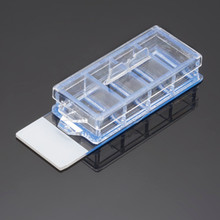 Loading... Please wait...
Loading... Please wait...Categories
- Home
- Lab Supplies
- Poly-D-Lysine Culture Slides
Poly-D-Lysine Culture Slides (BD Biocoat™)
Sold as cases of 12.
Poly-D-Lysine (PDL) are synthetic molecules used to enhance cell attachment to plastic and glass surfaces. For many anchorage-dependent cells, the nature of the culture substrate has a major effect on cell growth and the requirement for serum proteins. Tissue culture plastic has a net negative surface charge, which is produced by plasma treatment of the polystyrene. Over the years, many researchers have shown that serum-free or reduced serum cultures can be dramatically improved by coating the culture surface with positively charged polymers (i.e., PDL). Poly-Lysine surface treatment improves adhesive properties by altering the charge on the vessel surface from negative to positive. In addition to promoting cell adhesion, Poly-Lysine also enhances the adsorption of serum or extracellular matrix proteins to the culture substrate.
BD BioCoat™ Poly-Lysine Cellware is a line of tissue culture vessels with a uniform application of Poly-Lysine. This cellware is manufactured in a highly controlled environment and vigorously tested to assure product consistency and performance.
Applications include:
- Attachment and spreading of a variety of cell types
- Cell differentiation and neurite outgrowth
- Attachment of fastidious transfected cell lines
- Support survival of primary neurons in culture
- Serum-free or reduced serum culture
Quality Control
Tested for ability to promote firm attachment of RCG cells. Tested and found negative for bacteria and fungi.
Storage and Stability
Cellware stable for six months from date of shipment at 4-30°C. Coverslips, CultureSlides, and Coverslip-Bottom Dishes stable for at least three months from date of shipment at 4°C.
Free Shipping within the Continental USA

